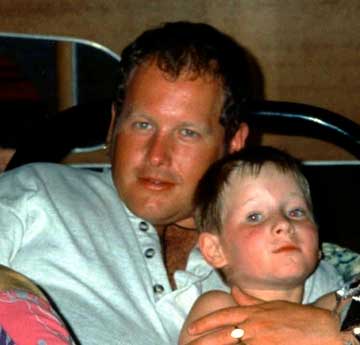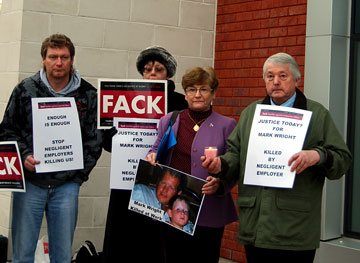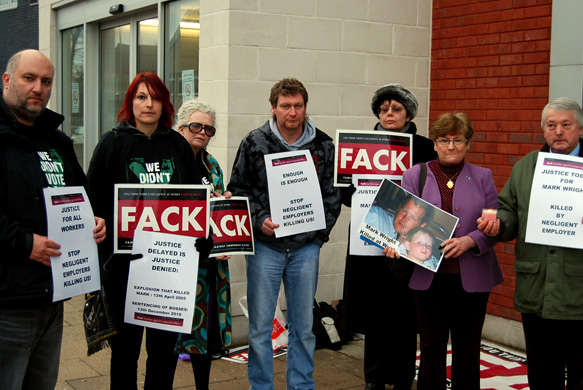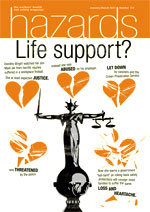
Life support?
Hazards issue 113, January-March 2011
On 12 April 2005, Dorothy and Douglas Wright received the call every parent dreads. “We received a phone call to come to Chester as Mark had been involved in an explosion and fire at Deeside Metal and there was no hope for his survival,” Dorothy recalls. Mark Wright, married to Andrea and with two young children, was clinging to life after suffering mortal injuries in a job he had predicted would kill.
“We left our home immediately and drove in silence for five hours going straight to the hospital, arriving after midnight,” Dorothy says. “I sat with my husband, Mark's wife and his son at Mark's bedside, seeing my son burned beyond recognition, until the life support system was switched off.”

MISSING DAD Leigh, who was 15 when his father died, sat at his bedside as he succumbed to awful injuries.
The 37-year-old scrapyard worker died on 13 April 2005 as result of 90 per cent burns and scorched lungs from inhaling high temperature gases.
He had been told to put 3,500 small air freshener aerosols, sent from Jeyes UK Ltd, into a mechanical crusher at Deeside Metal in Saltney, Flintshire.
The canisters were unmarked, transported without supporting documentation, handled at the scrapyard by untrained staff, and accepted at the scrapyard on the basis of unsubstantiated verbal assurances from the haulier, Ray Morgan.
The yard manager at Jeyes had claimed the canisters were empty – in reality, they contained up to 35 litres of highly combustible propellant. When they were put in the crusher, a spark ignited the vapour cloud released as the aerosols were compressed.
Mark, concerned about safety at Deeside Metal, had told family and friends months before he was looking for other work. A week before his death he had narrowly escaped injury when a car destined for the crusher burst into flames. He had suffered several burns and other injuries while at the firm, and had spent eight weeks off work with breathing problems he believed were caused by inhaling of toxic fumes at work.
“I spoke to him on 11 April when he phoned in great spirits,” says Dorothy. “He had found another job and was so pleased and incredibly relieved, he would hand in his notice that week. He never did that. I never spoke to my son again. The death he so accurately predicted was his own.”
Mark’s death haunts Dorothy. “I spent many months of sleepless nights, and nightmares when I did sleep, following this with the vision of my son engulfed in flames, the most terrifying and painful of deaths imaginable. I kept asking, why was this hazardous waste allowed to leave Jeyes’ premises? Why was Mark told to crush aerosols?”

CRIMINAL PROTEST Families Against Corporate Killers (FACK) founders Dorothy and Douglas Wright (above right), led a dignified protest outside the December 2010 prosecution related to their son Mark’s horrific fireball death. Those responsible were fined a total of £440,000. Thousands of aerosols containing flammable liquid had exploded in a scrapyard crusher. Dorothy says more families will pay a heavy price because the government is “hell-bent” on slashing workplace health and safety protection. more
She says Mark’s family received “a few days’ wages from the employer, nothing else, no message of concern or enquiry about the welfare of his widow or children.” Mark’s son, Leigh, was 15 and daughter Megan was just two.
“I had to put my grief to one side and track round the various government agencies, carrying my son's temporary death certificate, trying to sort out some kind of financial benefit for Mark's widow and children as she had no money to pay her bills or buy food.”
It hit Leigh, who was working for his exams and was his father’s “best friend”, especially hard. “For some weeks, he sat in his father's car, playing his father's CDs, wearing his father's clothes, withdrawn from the world.
“In the midst of our own shock and grief we felt helpless and no official help was offered, not by the school or any other body. My grandson was mentally unable to cope with school.”
Mark’s daughter Megan, who for many months “went to bed cuddling Mark's t shirt, still asks questions about why her dad was killed.” The christmas after Mark’s death, Dorothy asked Megan what she wanted from Father Christmas. “She replied: 'A big long ladder so that daddy can climb down from the sky and be here'.” Moved to tears, she wrote to Deeside Metal manager Robert Roberts “telling him of the children's agony.”

TODDLER’S TRAUMA After Mark’s death, daughter Megan would cuddle her father’s t-shirt at night.
There was no apology or sympathy. Instead, the family was to receive three visits from uniformed police officers.
The first, to the home of Mark’s widow Andrea and his two children, came with a warning that if Dorothy pinned any more flowers or cards on the railings of the industrial estate that housed Deeside Metal, “the employer would ensure that I was charged with criminal harassment.”
This was a body blow for Dorothy. “I needed to visit the spot where Mark ceased to be, to place flowers there... However the employer would not allow me on the premises, so I returned later to pin some flowers on the railing at the industrial estate.” She says she was being denied “the 'luxury' of simple grief.
“I contacted the police, then wrote another letter to the employer, at the suggestion of the police, to say that the pinning of flowers was intended to help the family in their grieving and in no way was intended as harassment of the employer and hoped they would understand that.”
Instead of resolving the issue, the explanatory letter resulted in a further visit from the police, this time to Dorothy’s home in Scotland. She showed the officers the correspondence with Deeside Metal and photographs of the flowers. “The policemen were totally shocked, they had not been told any of the circumstances, just that I should be told the employer would have me charged with harassment.” The officers apologised.
“I felt the police were being used as the instrument of harassment of a devastated grieving mother and grandmother, who had never had as much as a parking ticket in her life.” Dorothy says the family has been “made to feel that we are the real criminals” and that Mark’s death “had caused huge inconvenience and problems for his employer.”
In an angry outburst at the February 2009 inquest, Roberts had accused Mark's family of “hounding” him. “When we became upset by his evidence and had to remove ourselves from court, we were shouted at by Mark's general manager that we 'couldn't take the truth' and having to hear a director, under oath and in public, say they 'didn't bother with written risk assessments' as he 'considered all his employees to be illiterate',” Dorothy says.
The family was devastated by the Crown Prosecution Service’s (CPS) decision that neither Deeside Metal nor boss Robert Roberts should face manslaughter charges. In a series of meetings the family pointed out CPS had “erred in law”, failed to conduct a proper investigation and had not followed ‘Work-related deaths: A protocol for liaison’, the official procedure agreed between safety enforcers, police and the CPS.
It was over four years after Mark’s death when CPS obtained a crucial witness statement and decided Robert Roberts should face manslaughter charges. But this was far too late, a trial judge ruling in February 2010 proceeding would be “an abuse of process.” The family have since received an apology from Stephen O’Doherty of CPS’s Special Crime Division.
Roberts, Deeside Metal and Jeyes were all fined in December 2010, after pleading guilty to criminal safety breaches. “The result of this court action will change nothing for us, will bring no closure or easing of our pain or burden,” says Dorothy.
“This is too little, much too late to change anything. All that can be said is that the system is finished with us and can inflict no further agony on my family.”
• Dorothy and Douglas Wright are founder members of Families Against Corporate Killers (FACK).
Grieving mum warns safety cuts will kill

Dorothy Wright (second from right) says more families will pay a heavy price because the government is “hell-bent” on slashing workplace health and safety protection.
The grieving mother’s warning came in December 2010, after those responsible for her son Mark's death in a workplace fireball were fined a total of £440,000. Thousands of aerosols containing flammable liquid had exploded in a scrapyard crusher.
At Caernarfon Crown Court, Deeside Metal Company Ltd was fined £100,000 and £10,000 costs. Cleaning products giant Jeyes UK Ltd, the firm that sent the aerosol consignment, was fined £330,000 and £50,000 costs.
Both firms admitting failing to carry out risk assessments or train and monitor staff in the disposal of potentially hazardous materials. Mark’s manager at Deeside Metal, Robert Roberts, who had earlier claimed workers at the firm were “illiterate” and would not have understood risk assessments, was also fined £10,000.
Dorothy has been strongly critical about the way the case was handled and the lengthy delays. She said that the fines were the final act “in a travesty of British justice.” Manslaughter charges against Roberts were thrown out by a judge in February 2010 after a reluctant and botched investigation by the Crown Prosecution Service, for which the family subsequently received an apology.
Dorothy, who with her husband Douglas is a founder member of the campaign group Families Against Corporate Killers (FACK), said government cuts would make justice even more elusive for grieving families. “This government is hell-bent on removing the already woefully inadequate protection of the Health and Safety Executive by reducing their budget by 35 per cent leaving the safety of workers up to the employer's 'common sense',” she said.
“How can you leave the safety of workers to the 'common sense' of people like this? David Cameron's government intends removing all of the so-called ‘burden’ on employers of safeguarding the health and safety of their employees, but the real emotional and financial burden is borne by the families of up to 1,500 killed every single year by totally preventable incidents at work.”
In February 2011, Deeside Metal, which had pleaded guilty to criminal safety breaches linked to the death of employee Mark Wright, indicated it was going the appeal against the size of the fine.
Life support?
Contents
• Introduction
• Missing dad
• Criminal protest
• Toddler's trauma
• Grieving mum warns safety cuts will kill
Hazards webpages
Vote to die • Deadly business

